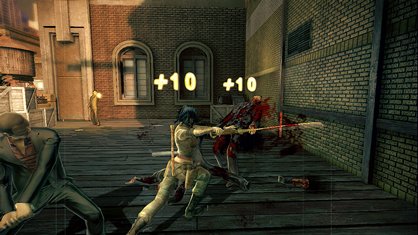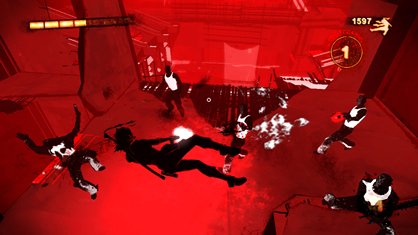GamesRadar+ Verdict
Pros
- +
Cheap thrills
- +
Bee-yoo-tee-ful Rage mode
- +
Moves smoothly and slickly
Cons
- -
Dumb and knows it
- -
Sad lack of enemy variety
- -
Short and forgettable
Why you can trust GamesRadar+
For those short on time, refer to our review of Wanted. It’s the same kind of game – short and bittersweet, poorly made but confident, filled with ideas but none of them strong enough to carry the game.

Wet is as dumb as it always promised to be – fourteen stages of constant blasting with the occasional platforming interlude. There’s blasting in corridors, blasting on the roofs of cars, blasting in arenas where you have to shut down the enemy’s spawnpoints, and blasting with the screen painted red; there’s blasting with pistols, shotguns, machine guns, and crossbows; and there’s blasting in boxy locations in San Francisco, Hong Kong, London, and The Sky.
Once upon a time Max Payne doled out its slow-mo in miserly bursts but Rubi has an infinite supply of Bullet Time. Every time your feet leave the ground or knees skid the concrete everything crashes into slow-mo. Cannon-fodder enemies flood into boxy arenas and hurl themselves in front of Rubi’s guns; it’s Stranglehold with The Club’s scoring system and Prince of Persia’s wall-running, and with unlimited slow-mo every shootout is rammed with the cheapest thrills imaginable.
It’s brutally simplistic in every possible way but it’s simplistic by design. Wet makes for a moronic four hours of mirth but it knows exactly what it is and what it wants to be – within its own limited template it’s a success. Rubi animates beautifully as she slides along every surface and dives through the air to bring her pistols to bear on the legions. Its story is pulpy nonsense and its music is rammed with twangy guitars and screaming nutcases.

It has a sense of bravado lifted from 70s cinema. Old drive-in intermission ads bookend levels while a scratchy grain filter and jumpy camera follow the action. Game designers owe a debt to Rodriguez and Tarantino for their revival of Grindhouse cinema because the scratchy grain filter thrown atop games like Wet and the Wii’s House of the Dead: Overkill hide every sin. Once you embrace the Grindhouse philosophy you have an excuse for everything you did badly. No cohesion between locations? Idiotic story? Laughable acting? Legions of cloned enemies, each with the same guns, clothes, and even faces? It’s not crap, it’s Grindhouse. Try that trick with that report your boss is after and see how far it gets you.
You can’t help but admire Wet’s balls, as stinky as they may be. Like Wanted you feel like an unstoppable bullet-spewing superhuman and for just a few brief hours you’ll laugh your way through ham-fisted levels, instant-death set pieces, and bad guys built solely for the purpose of being shot.
Wet isn’t a bad game because its designers failed at what they wanted to do; it’s a bad game because those designers made precisely the game they had always planned to make. It’s built to be basic and its limitations are built into the game at its very core. The thrills are as cheap as Happy Shopper cola but they’re still undeniably thrills.

In February Wet would be a rock-solid rental, in May it’s a pre-owned bargain, but one week before ODST and one month after Batman, it’s another Wanted-style cheeseburger in a world of filet mignon.
Sep 15, 2009
More info
| Genre | Action |
| Description | This game hits the low class action it aims for, but has such a dumb and unsophisticated way of presenting it, that it amounts to little more than a rental. |
| Platform | "PS3","Xbox 360" |
| US censor rating | "Mature","Mature" |
| UK censor rating | "18+","18+" |
| Release date | 1 January 1970 (US), 1 January 1970 (UK) |



